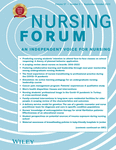Values elicitation among adults making health-related decisions: A concept analysis
Abstract
Aim
To conduct a concept analysis of values elicitation in the context of health care and treatment decision-making and formulate a conceptual definition.
Background
Values elicitation is a commonly cited term for an activity to help patients identify values and evaluate their application in health care decision-making, yet it remains ambiguous and difficult to differentiate from similar concepts.
Design
Concept analysis.
Data Source
Three databases, including PubMed, CINAHL Plus, and Scopus, were searched from inception to February 2021.
Review Methods
Walker and Avant's eight-stage method was used to identify attributes, cases, antecedents, consequences, and empirical referents and formulate a conceptual definition.
Results
The concept analysis identified 3 attributes, 10 consequences, 7 antecedents, and 3 empirical referents. Our analysis defines values elicitation as an intentional process whereby individuals explore their core beliefs, alone or with others, to (1) determine their preference, or a lack thereof, between health or treatment options, and (2) frame decisions.
Conclusions
The findings have the potential to influence the identification, discussion, and measurement of values elicitation by nurses and researchers across disciplines. Further exploration of this concept is warranted as the literature continues to emerge.
Open Research
DATA AVAILABILITY STATEMENT
Data sharing not applicable to this article as no datasets were generated or analyzed during the current study.




